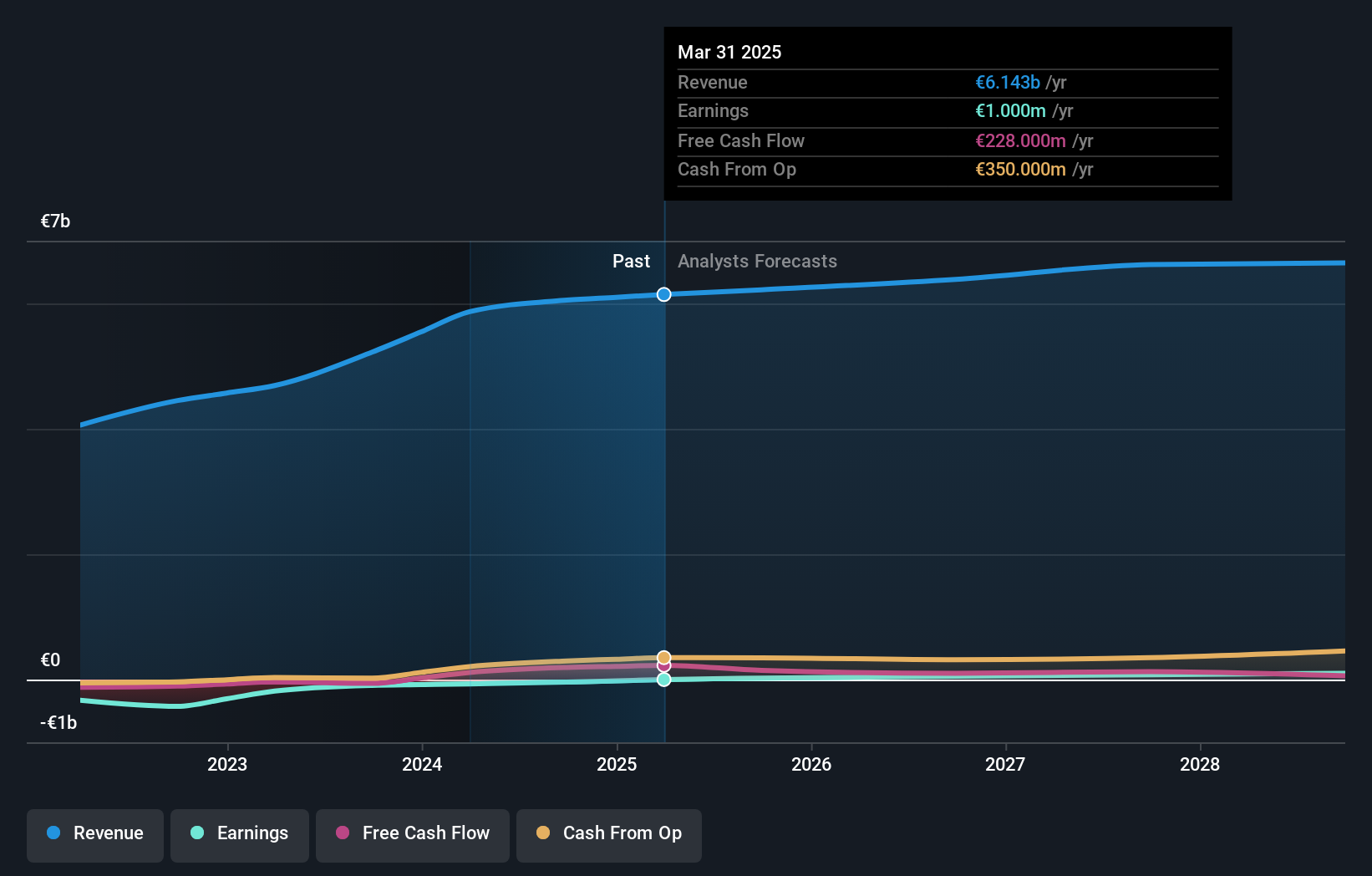- France
- /
- Hospitality
- /
- ENXTPA:ELIOR
Shareholders in Elior Group (EPA:ELIOR) have lost 34%, as stock drops 6.2% this past week
Passive investing in an index fund is a good way to ensure your own returns roughly match the overall market. Active investors aim to buy stocks that vastly outperform the market - but in the process, they risk under-performance. Unfortunately the Elior Group SA (EPA:ELIOR) share price slid 34% over twelve months. That's well below the market return of 13%. The silver lining (for longer term investors) is that the stock is still 32% higher than it was three years ago. The last week also saw the share price slip down another 6.2%.
With the stock having lost 6.2% in the past week, it's worth taking a look at business performance and seeing if there's any red flags.
We don't think that Elior Group's modest trailing twelve month profit has the market's full attention at the moment. We think revenue is probably a better guide. As a general rule, we think this kind of company is more comparable to loss-making stocks, since the actual profit is so low. For shareholders to have confidence a company will grow profits significantly, it must grow revenue.
In the last year Elior Group saw its revenue grow by 4.7%. While that may seem decent it isn't great considering the company is still making a loss. Given this lacklustre revenue growth, the share price drop of 34% seems pretty appropriate. In a hot market it's easy to forget growth is the life-blood of a loss making company. But if you buy a loss making company then you could become a loss making investor.
The graphic below depicts how earnings and revenue have changed over time (unveil the exact values by clicking on the image).

We know that Elior Group has improved its bottom line over the last three years, but what does the future have in store? Take a more thorough look at Elior Group's financial health with this free report on its balance sheet.
A Different Perspective
While the broader market gained around 13% in the last year, Elior Group shareholders lost 34%. However, keep in mind that even the best stocks will sometimes underperform the market over a twelve month period. Unfortunately, last year's performance may indicate unresolved challenges, given that it was worse than the annualised loss of 3% over the last half decade. We realise that Baron Rothschild has said investors should "buy when there is blood on the streets", but we caution that investors should first be sure they are buying a high quality business. While it is well worth considering the different impacts that market conditions can have on the share price, there are other factors that are even more important. Like risks, for instance. Every company has them, and we've spotted 2 warning signs for Elior Group (of which 1 is concerning!) you should know about.
Of course Elior Group may not be the best stock to buy. So you may wish to see this free collection of growth stocks.
Please note, the market returns quoted in this article reflect the market weighted average returns of stocks that currently trade on French exchanges.
Valuation is complex, but we're here to simplify it.
Discover if Elior Group might be undervalued or overvalued with our detailed analysis, featuring fair value estimates, potential risks, dividends, insider trades, and its financial condition.
Access Free AnalysisHave feedback on this article? Concerned about the content? Get in touch with us directly. Alternatively, email editorial-team (at) simplywallst.com.
This article by Simply Wall St is general in nature. We provide commentary based on historical data and analyst forecasts only using an unbiased methodology and our articles are not intended to be financial advice. It does not constitute a recommendation to buy or sell any stock, and does not take account of your objectives, or your financial situation. We aim to bring you long-term focused analysis driven by fundamental data. Note that our analysis may not factor in the latest price-sensitive company announcements or qualitative material. Simply Wall St has no position in any stocks mentioned.
About ENXTPA:ELIOR
Elior Group
Offers contract catering and support services in France and internationally.
Fair value with moderate growth potential.
Similar Companies
Market Insights
Community Narratives



